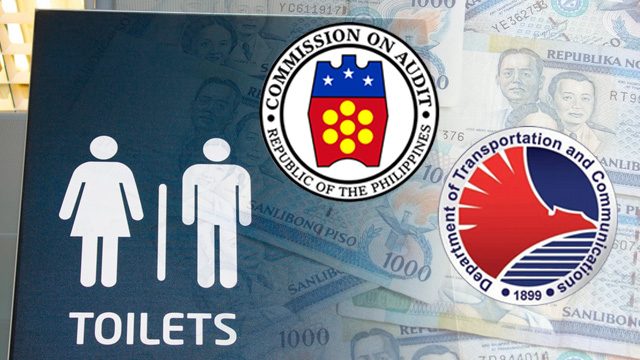SUMMARY
This is AI generated summarization, which may have errors. For context, always refer to the full article.

MANILA, Philippines – The Department of Transportation and Communications (DOTC) adopted a complicated procurement scheme for its toilets improvement project, leading to delays and possible wastage of some P352 million, state auditors said.
In a report released on January 7, the Commission on Audit (COA) said the DOTC entered into separate contracts for the civil works and supply of goods for its P351.86-million “Kayo ang Boss Ko” (KBK) toilet facilities improvement project for 10 agencies attached to the department.
This setup, COA said, “proved to be disadvantageous” to the government because it led to delayed implementation, suspended contracts, and failed biddings.
“The government may be left with unfinished/uncompleted toilet projects as a result of terminated contracts which could not be used by the intended beneficiaries and ultimately cause wastage of government funds,” COA said.
The KBK toilet project aimed to provide comfortable and clean toilets for the DOTC’s attached agencies:
- Land Transportation Office
- Land Transportation Franchising and Regulatory Board
- Manila International Airport Authority
- Civil Aviation Authority of the Philippines
- Mactan Cebu International Airport Authority
- Metro Rail Transit Line 3
- Philippine Ports Authority
- Cebu Ports Authority
- Philippine National Railways
- Light Rail Transit Authority
Funds originally for airport improvement
The funds, released in January 2012, were realigned from an allotment originally for the improvement of the country’s airport facilities.
In an attempt to save money by making bulk orders, the DOTC adopted a procurement system in which one construction firm was chosen for the civil works component while other suppliers were awarded the contracts for fixtures and accessories.
But auditors said the DOTC should have tapped local firms in each region to build and overhaul the restrooms. The audit agency added that delays in the project, aggravated by the Manila truck ban and port congestion, could have been prevented if the procurement system was implemented through a straight contract.
“Had these KBK projects been implemented through straight contract scheme, the issue on port congestion, truck ban, and delayed delivery of imported goods would have been minimized because the construction materials would just come from the local market within the vicinity of the project site,” COA said.
It added, “Most of the contracts for the civil works and goods should have been completed or delivered before end December 31, 2014. However, the contracts for civil works were far behind targets. Majority of the contractors for the civil works requested for suspension or already suspended due to delay in the delivery of phenolic boards and granite counter tops.”
Contracts that have already been terminated will have to wait for another budget allocation, as unobligated funds are ordered remitted to the Bureau of Treasury.
The audit agency said the DOTC should have considered “the most practical and easy procurement scheme” to avoid delays in the project. – Rappler.com
Add a comment
How does this make you feel?
There are no comments yet. Add your comment to start the conversation.